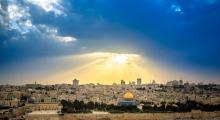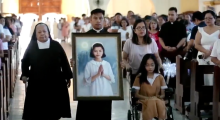Issued by the Catholic Center for Studies and Media - Jordan. Editor-in-chief Fr. Rif'at Bader - موقع أبونا abouna.org

Have the monks from one of the last monasteries in eastern Turkey finally won their battle?
In 2014, fifty properties belonging to the Syrian Orthodox Church were expropriated by the government in southeast Turkey.
Among them were several ancient monasteries where a dozen monks continue to live.
Since then, the monks have launched a series of legal cases to recover their properties.
A recent decree may finally grant them victory, according to a report in the Hürriyet Daily News in early February.
If the decree is in fact implemented, 30 properties located in the province of Mardin in southeast Turkey may be restored to the Foundation of the Mor Gabriel monastery, one of the most famous centers of Turkish Christianity.
Other properties involved in the saga include the Mor Malke, Mor Ya’qub and Mor Diment monasteries, all three of which are regarded as “very significant” sites, according to Rudi Sumer, the foundation’s lawyer.
The sites belong to a group of hermitages that are still operating in the Upper Mesopotamia region, which hosted many such sites in the early centuries of Christianity.
The region has even gained the nickname of a “Second Sinai” owing to the great number of such sites.
Located at the edge of Turkish Kurdistan, Tur Abdin (“mountain of the servants of God”) is the birthplace of Syrian Orthodox spirituality.
Progress on the property issue appears to have been made in recent months. Restitution of the Mor Gabriel monastery, founded in the fourth century, was announced last November.
Residents are still waiting for the decision to be implemented, the secretary of the local bishop told La Croix. However, he added that he welcomed the progress that has been made.
The battle, which has caused a rift between the Syrian Orthodox Church and the Turkish government over the last four years, resulted from an administrative imbroglio.
When a new law required the registration of church property, a number of properties owned by church foundations were not declared, since the law did not explicitly require this.
As a result of this failure to register, the sites remained the property of the nearby villages.
However, in 2014, the city of Mardin gained a new administrative status as a metropolis.
Surrounding villages, which were absorbed by the new metropolis, thereby lost their legal status and their properties were sold off.
Churches and monasteries were therefore transferred to the Turkish Treasury while the cemeteries became properties of the Mardin metropolis.
These interminable legal quarrels emerged over a background of fears that government regulations concerning Christians are tightening and worrying signs for democracy in Turkey.
However, according to Sébastien de Courtois, an expert on eastern Christianity and now the director of the French Institute in Ankara, this property dispute should not be regarded as an instance of “persecution” of minorities.
Rather, it is an example of “carelessness” by the authorities, who were unconcerned with the circumstances of Christians in this region located near Syria, he said.







